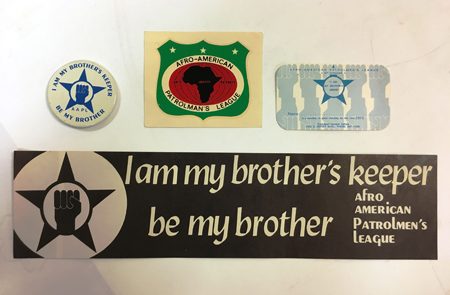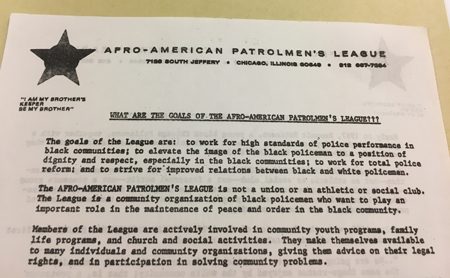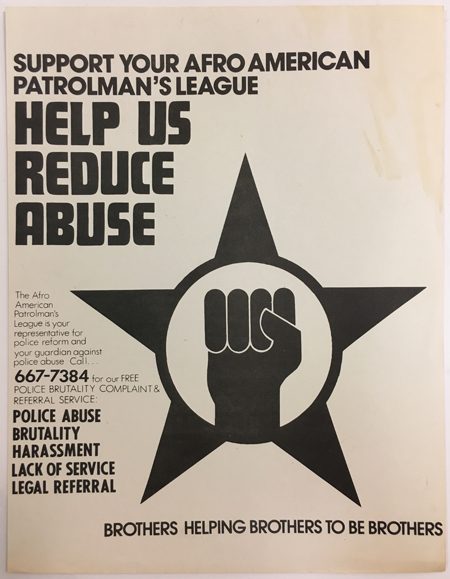Collections volunteer Robert Blythe details the history and contents of the African American Police League records in our Abakanowicz Research Center.
“Black Police League Has Tough Job Ahead.”
This headline could have been from yesterday’s newspaper, but in fact appeared in the Chicago Defender in September 1968. In May of that year, Chicago Police Department (CPD) officer Edward “Buzz” Palmer formed the Afro-American Patrolmen’s League (AAPL) in response to growing concern over the treatment of African Americans by and within law enforcement. Along with Palmer, founding members included fellow CPD officers Renault Robinson, Curtis Cowsen, Willie Ware, Wilbur Crooks, and Jack Debonnett and a civilian, Tom Mitchell.

Early AAPL paraphernalia in the collection includes (from top left) a pin, a decal sticker, a membership card, and a bumper sticker. AAPL records, box 242. All photographs by Museum staff
Other early leaders of the group, which later took the name of the African American Police League, included Patricia Hill and Howard Saffold. The organization’s goal, according to operational documents in the collection, was to “work for high standards of police performances in black communities; to elevate the image of the black policeman to a position of dignity and respect, especially in the black communities; to work for total police reform; and to strive for improved relations between black and white policemen” (AAPL records, Chicago History Museum, box 64). A significant portion of the papers of this group was recently opened for research after several decades of being under restricted access.

A document from the AAPL’s early years stating its goals. AAPL records, box 64.
In the late 1960s, black Americans were just beginning to enjoy broader employment opportunities, including in urban police and fire departments. African American police officers faced a dual challenge: they often had to fight for fair treatment and advancement opportunities, and yet were the daily representatives of what many in their own communities viewed as a menacing, racist force. In addition, in 1968 the embattled CPD faced intense and widespread criticism over its behavior during the riots that followed Dr. Martin Luther King’s assassination and in confronting demonstrators during the Democratic National Convention.
In this tense environment, the AAPL worked to educate all police officers about the culture and customs of communities of color; teach community members about the criminal justice system; and develop procedures for individuals to protest and try to correct abuses of police authority.

A flyer encouraging individuals to report police abuse. AAPL records, box 42.
The CPD opposed the formation of the AAPL and retaliated against its members. This led to a number of lawsuits and investigations, all of which are documented in the AAPL collection. Through an affiliate, the league instituted a complaint-and-referral service, and these previously restricted records are now available.
In late 1972, the AAPL joined several other similar organizations to create the National Black Police Association (NBPA). The NBPA supported the efforts of black officers nationwide, sought to recruit more minority officers, and provided a clearinghouse for the exchange of ideas and approaches to issues. Selected papers related to the NBPA are also included in the AAPL collection.
This extensive collection also contains some papers of AAPL founding member Renault Robinson. He was active in many organizations, including the Democratic Party, and served as a member and later chair of the commission directing the Chicago Housing Authority.
African American police officers have made tremendous gains since 1968. Nevertheless, many of the issues identified by the AAPL remain active concerns, and the organization’s papers could not be more relevant today. The AAPL collection can be accessed through the Chicago History Museum’s Abakanowicz Research Center.
Additional Resources
- See more images related to the Afro-American Patrolmen’s League
- Listen to Studs Terkel’s 1979 interview with Renault Robinson in which they discuss public housing, crime, and Chicago police